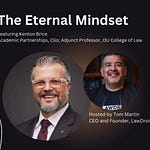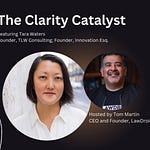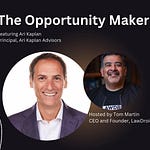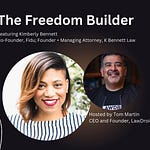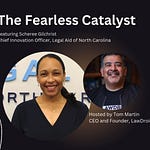Hey there Legal Rebels! 👋 I'm excited to share with you the 24th episode of the 2025 season of the LawDroid Manifesto podcast, where I will be continuing to interview key legal innovators to learn how they do what they do. I think you're going to enjoy this one!
If you want to understand how technology can transform legal aid delivery and scale access to justice beyond traditional one-on-one service models, you need to listen to this episode. Quentin is at the forefront of legal tech innovation in the access to justice space and has a unique perspective combining hands-on legal aid experience with cutting-edge technology implementation.
Transforming Legal Aid Through Technology Innovation
Join me as I interview Quinten Steenhuis, practitioner in residence and co-director of the Legal Innovation and Technology Lab at Suffolk Law School.
In this insightful podcast episode, Quinten shares his remarkable journey from growing up in a family of nine children in Ithaca, New York, to becoming a pioneering force in legal technology. He shares his 12 years at Greater Boston Legal Services, where he served both as a housing attorney and systems administrator, giving him a unique dual perspective on legal practice and technology infrastructure. Quinten demonstrates how his experiences representing tenants facing eviction led him to create innovative tools like Massachusetts Defense for Eviction (MADE), which transforms traditional legal clinic services into accessible, smartphone-friendly applications that can help thousands rather than hundreds.
His stories underscore the critical need to move beyond one-on-one service delivery models to one-to-many, technology-enabled solutions that can reach the thousands of people turned away from legal aid each year. This episode is essential viewing for anyone interested in the intersection of legal practice, technology, and social justice, offering valuable perspectives on how innovation can democratize access to legal services.
The Skinny
Quinten Steenhuis's path from alternative education activist to legal tech innovator perfectly embodies the evolution of access to justice advocacy. Growing up as one of nine adopted children in Ithaca's progressive community, Quinten was shaped by parents who valued social justice and democratic participation. His alternative high school experience with direct democracy and student empowerment, combined with early exposure to computer programming, set the foundation for his later work bridging technology and legal services. After studying logic and political science at Carnegie Mellon and becoming deeply involved in student activism and independent media, Quinten chose law school as a vehicle for systemic change. His 12-year tenure at Greater Boston Legal Services, where he uniquely served as both housing attorney and systems administrator, gave him intimate knowledge of both the human impact of housing insecurity and the technological infrastructure needed to scale solutions. This dual expertise led him to create tools like Massachusetts Defense for Eviction (MADE), transforming traditional legal clinics into accessible digital platforms. Now at Suffolk Law School's Legal Innovation and Technology Lab, Quinten continues pioneering work in legal technology, including breakthrough collaborations with Massachusetts courts for electronic filing integration.
Key Takeaways:
Alternative education with direct democracy shaped his collaborative innovation approach
Dual role as housing attorney and systems administrator provided unique insights into legal aid delivery
Helped over 1,000 people individually while thousands more were turned away annually
Created MADE as a "legal clinic in a box" transforming in-person services into smartphone apps
Demonstrates how technology can scale access to justice beyond one-on-one service models
Pioneered electronic filing integration with Massachusetts courts at Suffolk Law School
Eviction sealing project represents years of advocacy work from his legal aid days
Family values instilled "seven generations ahead" thinking about societal impact
Mock trial and student activism laid foundation for seeing law as systemic change vehicle
Independent media background developed community building and alternative communication skills
Notable Quotes:
"I spent 12 years at Greater Boston Legal Services representing tenants. I often saw how much of a barrier it was for a tenant that their landlord could just look up that tenant's name, whether they won or lost, whether they sued the landlord or the landlord sued them." - Quinten Steenhuis (02:14-02:27)
"At one point during the 12 years I was in legal aid, I helped a bit more than a thousand. Some of which were very brief service. Some of them were a case that we prepared it for trial and I had that same client working with me for a year or two years even." - Quinten Steenhuis (36:21-36:34)
"Every year we were turning away thousands of people that qualified for our help because we didn't have enough attorneys to represent them." - Quinten Steenhuis (36:41-36:44)
"I kind of think of it as being like a legal clinic in a box. The things that I was doing when I would meet one-on-one or in a clinic setting with a tenant that might take several hours from start to finish, how do we make those all accessible in a smartphone friendly format so someone could do it on their own schedule at their own home their own pace and we don't have to screen anybody out." - Quinten Steenhuis (37:28-37:54)
"You're thinking ahead, not just for what you need, not just for what your children need, but what's it going to be like seven generations from now? What's the world going to be like? It's hard for me to imagine not thinking in that way, that long-term planning and how we can improve the world for people." - Quinten Steenhuis (24:25-24:38)
"How do you make big societal change? The best lever that we had that time, for sure, was individual representation or maybe class actions, impact litigation. But it was happening in courts, and that's what I saw." - Quinten Steenhuis (21:30-21:45)
"If you were an eighth grader or above, you were allowed to create a class and teach it. So I did like a little mini class that I taught with computer programming basics as an eighth grader." - Quinten Steenhuis (10:50-10:56)
Clips
Defending a Vulnerable Veteran Against Unfair Eviction
From Protests to Open Publishing: Founding an Independent Media Center
Missing Out on Computer Science and Finding a Home in Logic and Philosophy
Saving a Family From Eviction Amid Gentrification
Quinten's story illustrates how personal experiences with progressive education and family values can shape a lifelong commitment to using technology for social good. His unique position as both attorney and systems administrator gave him insights that few legal professionals possess, understanding both the desperate human need for legal services and the technical infrastructure required to scale solutions. The creation of MADE represents more than just a technological achievement; it's a fundamental reimagining of how legal aid can be delivered in the digital age, transforming resource-intensive one-on-one services into scalable, accessible tools that can reach those traditionally excluded from legal help.
Closing Thoughts
Quinten Steenhuis represents the future of legal innovation, someone who deeply understands both the human stakes of legal problems and the technical possibilities for solving them at scale. His journey from alternative education to legal aid to legal tech innovation shows how diverse experiences can converge to create truly transformative solutions.
What strikes me most about Quinten's approach is how he's never lost sight of the human element while embracing technology's potential. His work at Suffolk Law School's Legal Innovation and Technology Lab, particularly the breakthrough electronic filing integration with Massachusetts courts, demonstrates that meaningful innovation requires both technical expertise and deep understanding of legal practice realities.
For our Legal Rebels community, Quinten's story offers both inspiration and a practical roadmap. You don't need to choose between serving people and embracing technology, the most powerful innovations come from understanding both deeply. His "legal clinic in a box" concept shows how we can maintain the quality and care of personal legal services while dramatically expanding access through thoughtful technology implementation.
As the justice gap continues to widen, innovators like Quentin are showing us how to build bridges rather than walls. The future belongs to those who can combine deep empathy for human problems with the technical skills to create scalable solutions. That's the essence of being a justice engineer.





